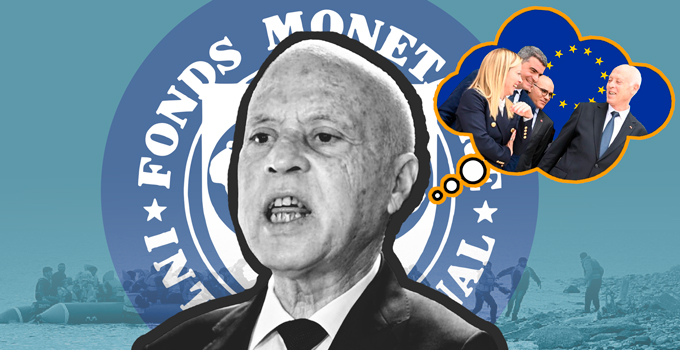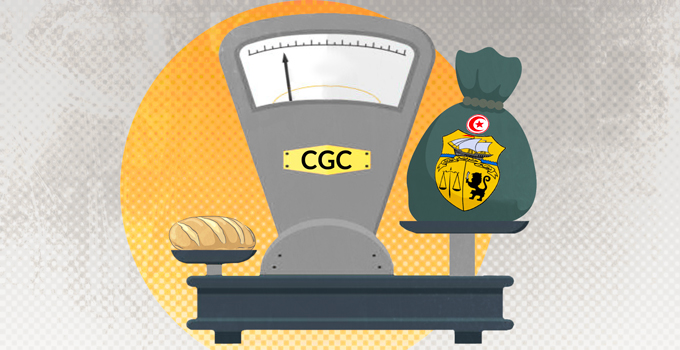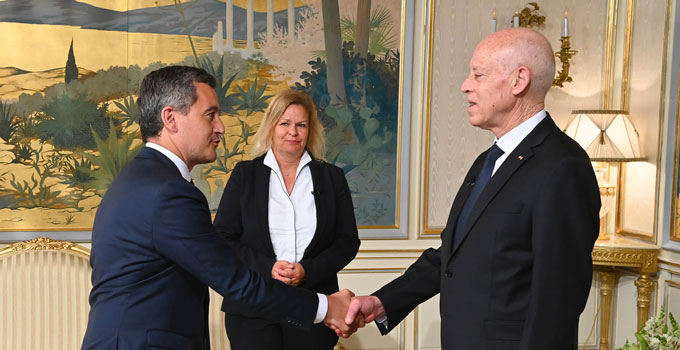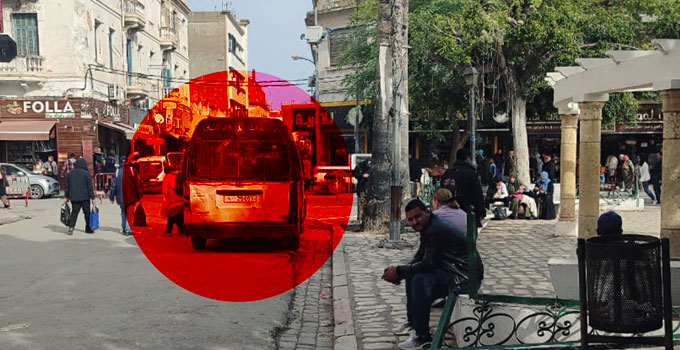While summer has drawn to an end, the same cannot be said of Tunisia’s lingering bread crisis. Across the country, citizens stand outside bakeries, waiting in endless lines in the hopes of returning home with a baguette or other variety of subsidized bread in hand. Faced with growing discontent, Kais Saied seized upon the issue armed with his usual rhetoric. Advancing conspiracy theory and denouncing speculators and smugglers, the president omitted any structural factors that might effectively serve to explain the crisis.
To validate this rhetoric, Saied published a table on the presidency’s official Facebook page outlining confiscated quantities of the raw materials used in making bread. What he neglected to mention is how these quantities relate to the population’s daily consumption. Initially, the Ministry of Commerce banned unlicensed bakeries from selling bread made with subsidized flour. However, backlash from bakers forced authorities to recant. Instead, it was decided that smaller breads (up to 20 cm long and 23 cm in diameter) not designated as baguettes can be sold for 200 millimes a piece. Additionally, unlicensed operations within the profession are no longer able to qualify themselves as bakeries.

Although these changes have stirred resentment among businesses in the industry, they have done nothing to alter the situation from the standpoint of consumers. To avoid the frustration of long lines and stock disruptions, many citizens have given in to purchasing unsubsidized bread. Incidentally, recourse to this option does not depend upon social factors, but rather the possibility of waiting in line for bread during the hours it becomes available throughout the day. Other consumers reap the benefits of a good rapport with their local bakers. In essence, what all of this amounts to is indirect subsidy cuts.
The scenario is nothing new to Tunisians: confronted with the recent shortages of cooking oil and sugar, consumers resigned to purchasing unsubsidized products. UGTT Secretary General Noureddine Tabboubi has reproached the situation on numerous occasions, denouncing authorities’ round-about tactics aimed at conditioning Tunisians to purchase products not subsidized by the government.
Reducing the wage bill
As discussed in a previous article, prospects of an administrative purge have consolidated into a top priority for the government, with Prime Minister Ahmed Hachani set to spearhead the mission. The scope of this « cleanse » has begun to take shape, centering on individuals who were recruited into the public service after 2011. It is easy to discern the political potential of this operation, which would both enable the expulsion of political adversaries, conveniently placed into the role of scapegoat, and also justify the executive’s lack of concrete results. But this strategy could bear yet another advantage. By dismissing employees recruited after 2011, the government would be able to reduce the country’s wage bill. Indeed, an agreement signed recently with the UGTT served to cap wage increases in the public service until 2025. The government is thus set to carry out its administrative witch hunt while reducing public expenditures on civil servants.

Significantly, these two reforms—subsidy cuts and reducing the wage bill—are among the issues which have stalled Tunisia’s agreement with the International Monetary Fund (IMF). In October 2022, experts working for the Tunisian government and their counterparts within the IMF wrote these provisions into the finance decree-law of 2023. In parliament’s absence at the time of adoption, the text was signed by Kais Saied and has yet to be modified by an amending law. Despite the president’s virulent discourse and the fact that discussions with the IMF seem to be at a standstill, Tunisia has not withdrawn its request for assistance. Given a lack of major financial assistance from Tunisia’s non-Western partners, a compromise with the Washington-based institution may be the regime’s only lifeline—even as Saied continues to proclaim anti-globalist views.
Europe’s border guard
A similar gap has emerged within the arena of diplomatic relations, where the government’s nationalist rhetoric is refuted by the reality at country borders. Under pressure from the Italian government headed by Giorgia Meloni, the European Commission signed a memorandum with Tunisia for a « global » partnership. As discussed in a previous article, migration is the cornerstone of this agreement. Officially, Tunisia affirms that it has no intention of playing watchdog for the borders of other countries. This assertion, however, is refuted by fact. By blocking departures and refusing entry to sea vessels, Tunisian authorities have assumed de facto the role of EU border guard. Ever since the statement by President Saied on February 21, 2023, Brussels cannot overlook the mistreatment of sub-Saharan migrants on Tunisian soil. Nevertheless, this reality has clearly not been enough to dissuade the Commission from cooperating with authorities who might enable them to avoid accusations of human rights abuses on their own soil.

Another implication of the memorandum in question would be Tunisia’s continued attachment to the Western sphere of influence. As actors like China, Russia and Turkey further expand across the African continent, Tunisia remains under the wing of its friends to the West. While those close to the current regime advocate for Tunisia’s cooperation with the BRICS, no steps have been taken in this direction. Moreover, the non-admission of Tunisia’s « big sister », Algeria, into the BRICS conglomeration renders unlikely the possibility of Tunis’ geopolitical repositioning.
As the divide between official discourse and reality at the borders grows, Tunisian authorities have chosen to respond using an approach of intimidation and repression. In this context, the Ministries of Justice, Interior and Information Technologies issued a joint statement highlighting the provisions under article 24 of the Decree-law 2022-54, a measure widely denounced by the regime’s opposition and NGOs. Several days later, the Ministry of Foreign Affairs, Emigration and Tunisians Abroad published a statement along the same lines. The government’s preference for threat tactics hints at efforts to impose an « official truth » while suppressing any discourse that might threaten to expose the widening gap between words and actions.







Merci
Finances